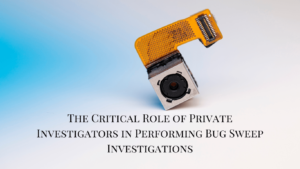Online dating can be a wonderful way to meet people, but it also has its risks. Scammers often use fake profiles to trick users into giving away money or personal information. Private investigators play a crucial role in catching online dating scammers by using specialized skills to uncover fake identities and alert potential victims.
They often start by thoroughly analyzing suspect profiles. This includes examining photos, messages, and social media accounts for inconsistencies or red flags. They use various tech tools and databases to track unusual behavior patterns that indicate scams.
Private investigators also liaise with law enforcement to gather evidence and take action against scammers. By working together, they help maintain safer online dating environments. Understanding these techniques can help people feel more secure when navigating the world of online romance.
Understanding Online Dating Scams
Online dating scams have become a significant concern for many users worldwide. They target users looking for love and companionship, often swindling them out of money and personal information. Knowledge about this can help protect from falling into these traps.
Defining Romance Fraud
Romance fraud involves scammers creating fake profiles on dating sites to attract victims. They pretend to form a relationship, building trust over time. Once trust is gained, they invent emergencies, asking for money, gifts, or personal details.
These scammers are skilled at using emotional manipulation. It’s common for interactions to include promises of love, marriage, or even business partnerships. The goal is to keep the victim engaged until they fulfill their requests.
Victims often feel pressured, fearing to lose the relationship. This pressure can lead them to ignore warning signs, making them vulnerable. Protecting oneself involves keeping personal and financial information private and not sending money to people met online.
Prevalence of Online Dating Scams
Online dating scams are widespread, with thousands of cases reported yearly. These scams thrive on platforms where people seek companionship. Reports show a high incidence of fraud complaints, costing victims millions of dollars.
Fraudsters do not only target a specific demographic. They go after people of any age, gender, or background. The internet enables them to operate from almost anywhere, adding to the challenge of tracking them down.
Organizations like the FBI and online platforms have been working to increase awareness. They encourage people to report suspicious activities and educate users on recognizing scams. Although progress is being made, the problem remains significant.
Profiles of Typical Scammers and Victims
Scammers often operate from countries with weak laws against online fraud. They may use scripts or bots to manage multiple victims. These individuals are experts at gaining trust and leveraging emotional tactics.
Victims, on the other hand, often include those feeling lonely or seeking companionship. They may be new to the online dating scene, making them easy targets. Despite efforts to educate users, many still fall victim due to the sophisticated nature of these scams.
Recognizing patterns such as quick expressions of love or excuses for not meeting in person can help prevent falling prey. Staying informed and vigilant is crucial for anyone engaging in online dating.
Methods of Investigation
Private investigators use different ways to spot online dating scammers. Their strategies include gathering information, studying digital trails, and using special software.
Initial Assessment and Data Gathering
In the first step, investigators collect all possible information about the person in question. They review profiles and saved messages, noting any suspicious details. This early stage is crucial for understanding the case thoroughly.
They look for things like inconsistencies in stories or photos. They might also search for similar profiles on various dating platforms. Public records and social media accounts are checked for matching details.
Sometimes, they also contact friends or acquaintances for more background information. All of this helps them create an initial profile that guides the investigation.
Use of Specialized Software and Tools
To enhance accuracy, investigators employ specialized software and tools. Reverse image searches help verify if profile pictures are stolen or misused. These tools scan thousands of websites rapidly.
Another tool is data-mining software, which collects hidden information that isn’t easily accessible. This helps in mapping connections between online accounts.
Specialized security tools reveal IP addresses and track online behavior with precision. They ensure all findings are backed by concrete data. Using these technologies, investigators can stay one step ahead of scammers. These tools play a significant role in catching deceptive activities in online dating fraud.
Catching Scammers in Action
Private investigators have special ways to track down online dating scammers. They use specific methods like sting operations and undercover communication to catch these scammers.
Setting Up Sting Operations
Setting up a sting operation is one method private investigators use to catch scammers. They create fake profiles on dating sites. These profiles are designed to look appealing to scammers. Once a fake profile is set up, the investigator waits for a scammer to make contact.
The goal is to gather information. The investigator looks for signs of scamming, such as requests for money. They collect data on the scammer’s behavior. Collecting evidence is crucial to understand and expose their tactics.
The operation must stay secret. Investigators use secure tools to hide their identity and location. Keeping the sting operation under wraps ensures scammers do not catch on. Each step is carefully planned to avoid mistakes.
Undercover Communication Strategies
For investigators, effective communication is key in uncovering scams. They carefully engage in conversations with potential scammers. By asking the right questions, they can reveal hidden motives and gather information.
Investigators know how to steer conversations. They guide dialogue to expose inconsistencies in a scammer’s story. This helps build a profile of the scammer’s identity and methods.
A variety of techniques are employed. For instance, they use text analysis to identify patterns. This analysis helps in detecting fake profiles and messages. Investigators rely on these methods to catch scammers red-handed without revealing their true identity.
Leveraging Social Media and Networks
Private investigators use social media and networks to find online dating scammers. They analyze social connections and identify impersonation and catfishing techniques.
Analyzing Social Connections
Private investigators study a scammer’s social connections to gather evidence. This includes checking mutual friends, followers, and interactions on sites like Facebook, Instagram, and LinkedIn. Scammers often create complex networks of fake profiles to seem trustworthy.
Investigators look for signs such as profiles with few friends or followers, often linked to other suspicious accounts. Publicly available data is examined to find inconsistencies in personal stories or shared content. Investigators may also use tools that track social media activity or compare profile pictures across different platforms. These methods help expose fake identities and uncover hidden connections between accounts.
Impersonation and Catfishing Techniques
Scammers use impersonation to gain victims’ trust. They steal photos and details from real people to create convincing profiles. Private investigators identify these frauds by conducting detailed photo checks and cross-referencing profiles.
Tools like reverse image search are used to spot stolen images. Investigators also focus on patterns in language or unusual behavior in communications. Many scammers follow scripts to engage with multiple victims. By recognizing repeated phrases or tactics, investigators can spot these schemes quickly. Detecting these techniques helps protect people from falling for traps set by scammers.
Legal and Ethical Considerations
When investigating online dating scams, private investigators must carefully navigate legal and ethical landscapes. These aspects ensure that methods are both lawful and morally acceptable.
Privacy Laws and Regulations
Private investigators need to be aware of privacy laws in their region. Laws like the GDPR in Europe or HIPAA in the United States set rules for collecting and processing personal data. They must obtain information legally without breaching privacy rights.
Many countries restrict accessing private accounts, such as emails or social media profiles, without consent. Investigators often require permissions or warrants when dealing with sensitive information.
Failure to follow these regulations can lead to legal penalties. This makes a strong understanding of current privacy laws essential for effective and lawful investigations.
Ethical Boundaries of Online Investigations
Ethics are crucial in online investigations. Investigators must avoid deceptive tactics, like creating false profiles or engaging in catfishing activities. This helps maintain trust with those they are trying to protect.
Respecting the rights of all involved parties is important. Private investigators tread carefully to not harm innocent individuals while gathering evidence.
They must also balance pursuing justice with respecting privacy. Many adhere to professional codes of conduct to guide decisions. This ensures integrity in the investigation process, protecting both their reputation and the interests of those they serve.
Collaboration with Law Enforcement
Private investigators work closely with law enforcement to handle cases involving online dating scams. They share crucial evidence and often join forces for surveillance operations to track and catch scammers.
Sharing of Evidence and Information
Private investigators gather evidence by tracing online activity, identifying aliases, and collecting financial records. They share this information with law enforcement to help pinpoint suspects. Documentation like chat logs, emails, and recorded calls are crucial.
Information sharing is systematic and organized. Investigators prepare detailed reports and submit them to the authorities. Clear communication is essential in making sure everyone involved understands the case details.
Joint Operations and Surveillance
In some instances, private investigators and law enforcement unite in joint operations. This coordinated effort maximizes resources and enhances the effectiveness of the investigation. Surveillance is often a key part of these joint ventures.
Both parties bring specialized skills to the table. Investigators often provide insight into digital patterns, while law enforcement offers tactical support. By working together, they increase the chances of catching scammers.
Prevention and Awareness Strategies
To fight online dating scams, teaching people about these scams and giving them good resources are vital. People need to know how to spot scams and where to find help if needed. This helps keep everyone safer and better informed.
Educational Initiatives for the Public
Educational programs aim to inform the public about the dangers of online dating scams. Workshops and seminars are set up in community centers and schools. These events show how scammers operate and give tips on staying safe.
Online courses and webinars offer more flexible learning. They cover recognizing red flags and using secure communication methods. Governments and NGOs often back these efforts, making them available to many people.
Social media campaigns also raise awareness. They reach a wide audience with posts that warn of scam tactics and share personal stories. These campaigns help people become more aware and cautious when dating online.
Creating Anti-Scam Guides and Resources
Detailed guides break down common scam techniques people might face online. These include tactics used by scammers and the language they often use.
Checklists: Offering clear lists of warning signs helps users identify scammers quickly. Users can keep printouts or digital copies handy on their devices.
Online platforms provide digital resources like e-books and PDFs. Users can download these easily to learn more in-depth ways to protect themselves.
Websites and Apps: Some sites have dedicated pages for scam prevention. These sections contain real-life examples and expert tips. Apps can offer push notifications to alert users to new scam trends.
Having the right tools and information gives users the upper hand against scammers.
Success Stories and Case Studies
Private investigators have solved many cases involving online dating scams. They use various techniques to track and unmask scammers. These stories show how effective their methods can be.
Case Study 1:
A woman in her 50s was tricked into giving money to a scammer who posed as a soldier. The investigator found that the photos used were stolen from social media. They traced the scammer’s location and helped the woman recover some funds.
Case Study 2:
A young man suspected his online girlfriend was fake. An investigator discovered the girlfriend was using photos and stories from different people. This helped the man avoid sending money to the scammer.
Case Study 3:
A man almost fell for a fake profile of a model. The investigator checked image and profile details. It was found that the profile was used in multiple scams. This evidence was crucial for reporting and blocking the scammer.
Success Techniques:
- Image Searches: Verifying photos using reverse image tools.
- Profile Checks: Analyzing details and cross-referencing information.
- Location Tracking: Identifying IP addresses and inconsistencies.
These successful cases prove that with the right skills and tools, investigators can stop scammers. They protect victims from financial and emotional harm.
Conclusion and Best Practices
Private investigators use a strategic approach to catch online dating scammers. They leverage technology and investigative skills to uncover scam patterns and tricks. This ensures individuals can safely navigate the online dating world.
Best Practices:
- Verify Information: Always check the background of an online profile. Look for inconsistent information.
- Use Reverse Image Searches: A quick image search can reveal if photos are stolen from other sites. This is a common tool used by investigators.
- Be Wary of Requests for Money: Scammers often ask for money after building trust. Legitimate people typically do not make such requests.
- Check for Weird Behavior: Sudden changes in communication style or stories can be red flags. A private investigator looks for these anomalies.
- Secure Personal Information: Never share personal details too quickly. Scammers can use this data for fraud.
By keeping these best practices in mind, anyone can reduce the risk of falling victim to an online scam. They offer guidance to ensure online interactions are genuine and safe.
Frequently Asked Questions
Private investigators use various methods to catch online dating scammers. They rely on technology, social media, and professional skills to identify and track scammers. Costs can vary based on the complexity of the case and services required.
Can a private investigator track down a scammer?
Yes, private investigators can track down scammers by gathering information on the scammer’s online activities and identities. They use specialized tools to trace digital footprints and often collaborate with law enforcement to bring scammers to justice.
How to outsmart a romance scammer?
Detecting inconsistencies in stories and verifying personal details are key strategies. Keeping communication within the dating platform and being wary of sob stories can help. If things seem suspicious, consulting with a private investigator is also a wise step.
What techniques do private investigators use to catch online dating scammers?
Private investigators utilize techniques such as reverse image searches, digital record analysis, and data mining. These methods help identify fake profiles and gather evidence against suspected scammers. They also review social media activity to find discrepancies or hidden connections.
What are the costs associated with hiring a private investigator for social media investigations?
Costs vary based on the complexity of the investigation and time required. Basic inquiries might start at a few hundred dollars, while detailed investigations could cost more. Discussing the scope of services with the investigator will provide a clearer idea of potential costs.
What services do online investigation firms offer to identify dating scams?
Online investigation firms offer services like identity verification, background checks, and monitoring online interactions. They can also provide cybersecurity measures to protect clients from future threats. These services aim to identify and stop scammers before they cause harm.
How do private investigators leverage social media to catch cheaters or scammers?
Private investigators examine social media profiles for inconsistencies or fake information. They analyze friend lists, tagged locations, and interactions to uncover hidden activities. This helps them track movements and reveal connections that might indicate scam behavior.





